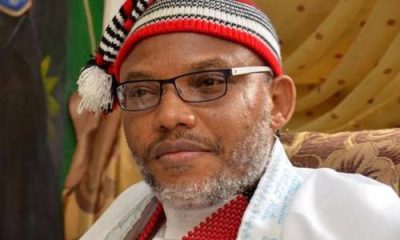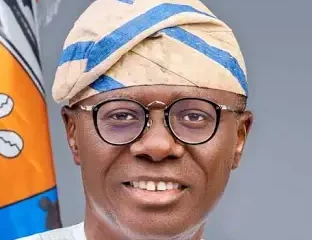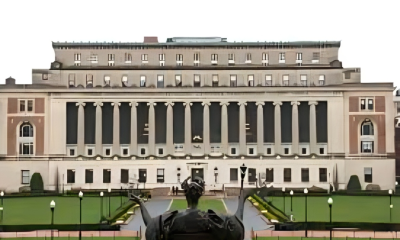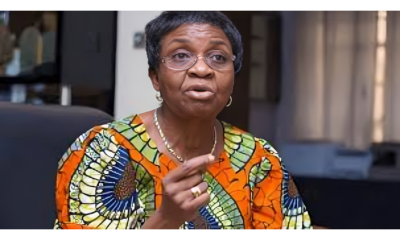NEWS
FG to issue Executive Order to Cut Costs of Medicine – Pate

By Our Reporter
In a move to curtail the hike in pharmaceutical pricing and lower the cost of necessary medications for residents, the federal government said it will issue an Executive Order soon.
The Coordinating Minister of Health, Ali Pate, disclosed while briefing State House Correspondents on Wednesday after the Federal Executive Council (FEC) meeting presided over by President Bola Tinubu at the Presidential Villa, Abuja.
The minister regretted that rising drug costs have put life saving commodities out of reach for many Nigerians.
Pate explained that the Executive Order aims to enable local drug manufacturers to thrive, while ensuring fair pricing of essential medicines.
He added that the decision follows the exit of major multinational pharmaceutical companies from Nigeria, reducing competition.
According to him, the order reflects President Tinubu’s commitment under the Renewed Hope Agenda to prioritize healthcare access.
He said “consistent with the President’s Renewed Hope Agenda, which puts the human capital, health and social welfare of Nigerians at the centre, today at the Federal Executive Council, Mr. President took three far-reaching decisions relating to the health sector.
“The first is the rising cost of pharmaceuticals, the hike in prices that we have in the pharmaceutical industry, which is going beyond the reach of many Nigerians, life-saving commodities, devices like syringes and needles and the exit of major companies from our market.
“Those decisions also include the regulation of the sector to protect the health and well being of humans and the third decision is regarding how we deal with the crisis of human resources in the health sector.
“The first on the syringes, drugs, pharmaceuticals and other devices, as you’ll recall, Mr President, in his wisdom, at the end of last year, in October, approved an initiative to unlock the healthcare value-chain and appointed a coordinator for that. But we know that the price of pharmaceuticals have escalated and many entities have decided to withdraw and some of the local manufacturers in Nigeria are struggling.
“President’s intent is that we begin to take steps to enable the local manufacturers to survive, to thrive and to deliver the basic commodities that are key to saving their lives.
“And he directed that the Attorney General of the Federation work with us to come up with an Executive Order, which is the mechanism through which he will act, given the concern that he has that many Nigerians are suffering from the costs of pharmaceuticals, as well as other devices. That is the first important step and that should be coming very soon.”
The coordinating minister also said to strengthen healthcare regulation and protect citizens, key regulatory bodies including the Medical and Dental Council will continue to receive funding, except from cuts impacting other professional associations.
He added that to address the shortage of healthcare workers, the council has delegated approval of recruitment waivers to the Health Ministry directly.
According to him, this will accelerate hiring and reduce delays.
“The third is regarding the acute human resource shortage that we have. We know and having gone around many of our hospitals, particularly federal tertiary hospitals, the replacement of health workers that leave oftentimes takes a very long time because the waiver process takes several stages.
“Mr President directed in council that the approvals of those waivers be delegated to the Federal Ministry of Health and Social Welfare so that it doesn’t have to go through the Office of the Head of Civil Service of the Federation.
“That will hasten the recruitment of health workers in terms of those who are out there unemployed, within limits of their fiscal resources.
“All in all, to say that President is very keen that we drive forward to safeguard the health of Nigerians, to earn the confidence, the trust of Nigerians and to deliver for Nigerians in this new year that we have started and the marching orders are very clear,” he added.
NEWS
NELFUND Assures Lawmakers of Prudent Disbursement of Funds

The Nigerian Education Loan Fund (NELFUND) has reaffirmed its commitment to transparent and responsible disbursement of student loans across the country.
NELFUND’s, Managing Director, Mr Akintunde Sawyerr, made this known during an oversight meeting with the House Committee on NELFUND on Wednesday in Abuja.
Sawyerr disclosed that 90 per cent of all funds received by the agency were strictly allocated for student loans, in line with the law.
“Ninety per cent of funds that come to NELFUND are to be spent exclusively on loans. These funds must go towards paying students’ fees and cannot be diverted or used for any other purpose,” he stated.
He added that any deviation from this mandate would constitute a breach of the law.
Providing an update on disbursement, Sawyerr disclosed that a total of ₦54 billion had so far been disbursed to students and institutions nationwide.
According to him, “NELFUND has paid 303 government-owned institutions, including universities, polytechnics, and colleges of education, and disbursed approximately ₦54 billion in total.“
He further explained that ₦30 billion out of the total amount was paid directly to the institutions, while ₦24 billion was disbursed as stipends to 293,000 Nigerian students enrolled in public tertiary institutions.
Earlier, the Chairman of the House Committee on NELFUND, Rep. Ifeoluwa Ehindaro, said the meeting was convened to clarify reports and address public concerns regarding potential mismanagement of funds.
“You have been invited to provide clarification and enlighten this committee on issues surrounding the disbursement and administration of student loans by your agency,” Ehindaro said.
The News Agency of Nigeria (NAN) reports that the meeting followed recent allegations by the Independent Corrupt Practices and Other Related Offences Commission (ICPC) concerning fund diversions at NELFUND. (NAN)
General News
Sanwo-Olu Reaffirms Support for SMEs, Unveils N10m Loan Initiative
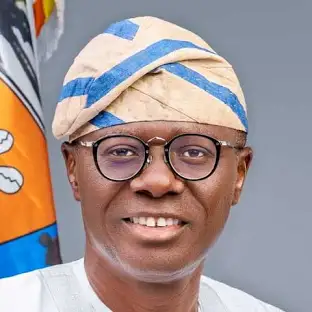
Gov. Babajide Sanwo-Olu of Lagos State has unveiled the Lagos State Access to Finance for SMEs through Cooperatives (LASMECO) to provide access to finance for Small and Medium Scale Enterprises (SMEs) and registered cooperative societies in the state.
Sanwo-Olu unveiled the initiative at the Adeyemi Bero Auditorium, Alausa, Ikeja, on Wednesday in partnership with Bank of Industry (BoI) and Sterling Bank Ltd.
He said the tripartite initiative was designed to break the funding barrier to enable SMEs to access up to N10 million at a single-digit interest of nine per cent per annum without collateral.
LASMECO is a first-of-its-kind public-private financing platform that aims to deliver low-interest, risk-mitigated loans to SMEs across strategic sectors, including healthcare, agriculture, creative industries, manufacturing, and circular economy clusters.
The initiative is a game changer that will accelerate access to finance for SME business owners in the state by providing a loan of up to N10 million at nine per cent interest rate for two to three years.
The governor advised the beneficiaries to use the money and grow for their businesses judiciously.
“I stand here today filled with pride and hope. Pride in the indomitable spirit of Lagosians, and hope for the future we are building together.
“This occasion, the launch of the joint initiative between the Lagos State Government, Bank of Industry, and Sterling Bank MSME Fund, is not just a formal unveiling of a financing programme.
“It is the unveiling of dreams, the lighting of thousands of small candles that together will illuminate the path to a more prosperous and inclusive Lagos.
“Let me begin with a story that captures why this moment matters. A few years ago, I met a young woman named Bisola in Alimosho. Bisola ran a small tailoring business out of a single shop.
“She had creativity, she had customers, and she had ambition, what she didn’t have was affordable capital to expand. Traditional loans were out of reach without collateral, so for years her dream of opening a small factory remained just that: a dream.
“In 2020, through a Lagos State support scheme for small businesses, Bisola accessed a low-interest loan. With that little boost, she bought two additional sewing machines and hired three apprentices from her community,” the governor said.
The governor further said that there were other Bisola’s that would benefit from the scheme.
Sanwo-Olu commended the contribution of the informal sector to economic growth and development.
“Bisola’s story is not only inspiring, but it is unique. It is one of thousands of success stories our Micro, Small, and Medium Enterprises (MSMEs) have written across this great state.
“From the bustling markets of Balogun and Idumota, to the tech hubs of Yaba, to the bustling garages in Ikeja and the creative studios in Surulere, our MSMEs are the unsung heroes of Lagos’s economy.
“They are the backbone and the heartbeat of our drive toward prosperity. When we talk about making Lagos a 21st century economic powerhouse, it is their energy and innovation that power the engine.
“Think about it, MSMEs account for almost 96 per cent of businesses in our nation and nearly half of our GDP. Here in Lagos, we are proud to host the highest concentration of these enterprises in Nigeria.
“That means millions of our citizens wake up every day as owners of small shops and stalls, founders of startups, operators of restaurants and factories, providers of services and artisans of trade.
“Together, these hard-working men and women employ the vast majority of our workforce and provide livelihoods for countless families. They turn the cogs of commerce in every neighborhood, from Epe to Eko, Badagry to Ikeja,” he said.
Also speaking, the Commissioner for Commerce, Cooperatives, Trade and Investment, Mrs Folasade Ambrose-Madebem, described the initiative as a revolutionary financing scheme for MSMEs to provide a single digit non-collateralised loan.
Ambrose said the loan to be given to businesses under cooperatives would unlock the next generation of entrepreneurs in the state.
“So, as we begin this journey today, let us remember that this is not just about launching, it’s about unlocking the next generation of entrepreneurs.
“This is about creating a type of globally grown, globally competitive enterprise that will find its future opportunities.
“It’s about ensuring that whether you’re a young woman in Badagry, a healthcare provider LASMECO will work for you,” she said.
The Managing Director of BoI, Dr Olasupo Olusi, said the bank partnered Lagos State on the initiative to ensure access to finance for MSMEs to tackle poverty and guarantee economic growth in communities.
NAN reports that the highpoint of the event was the signing of the Memorandum of Understanding on the initiative between the Lagos State Government, Bank of Industry and Sterling Bank. (NAN)
Foreign News
Columbia University To Lay Off Nearly 180 Staff After Loss Of Federal Funding

Columbia University announced Tuesday that it will lay off nearly 180 staff members following President Donald Trump’s decision to revoke $400 million in federal funding. The funding cut is reportedly in response to the university’s handling of student protests against the war in Gaza.
According to a statement from the university, the layoffs represent approximately 20 per cent of employees whose roles were supported in some way by the now-terminated federal grants.
“We have had to make deliberate, considered decisions about the allocation of our financial resources,” the university said.
“Those decisions also impact our greatest resource, our people.
We understand this news will be hard.”University spokesperson Jessica Murphy declined to comment on whether more layoffs are expected but said Columbia was taking a range of steps to enhance financial flexibility. These include maintaining current salary levels and offering voluntary retirement incentives.
In addition, the university planned to scale back research activities. Some departments would wind down specific studies, while others would continue limited operations as they sought alternative funding sources.
Research areas impacted include projects such as the development of an antiviral nasal spray for infectious diseases, studies on maternal mortality and morbidity, treatment research for chronic conditions like long COVID, care for newborns with opioid withdrawal syndrome, and colorectal cancer screenings. (AP/NAN)

